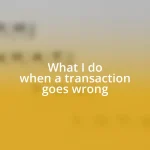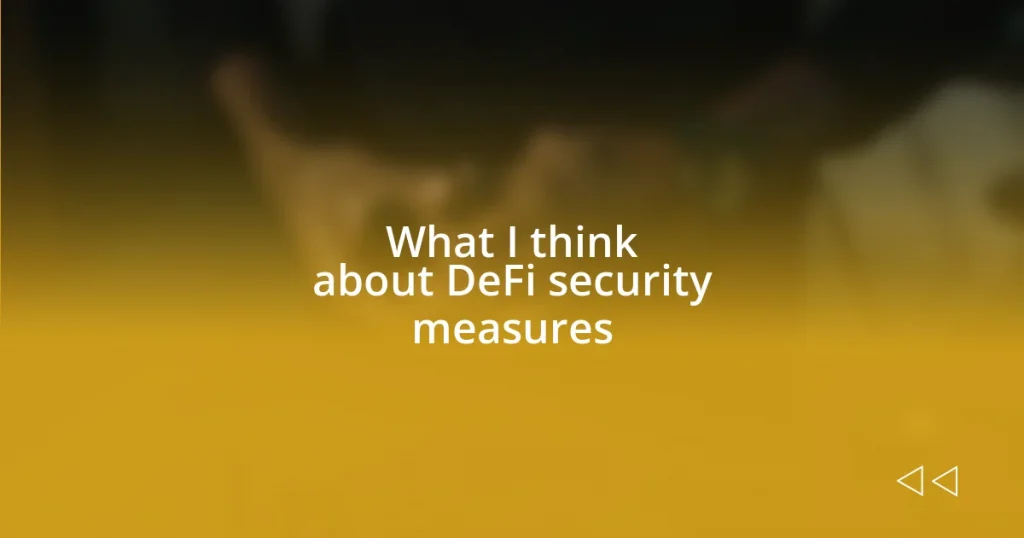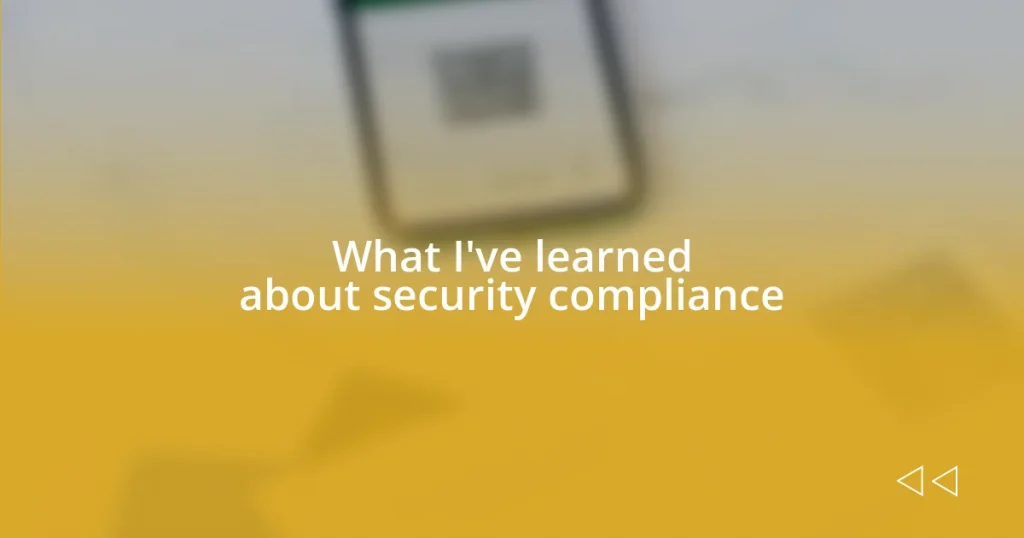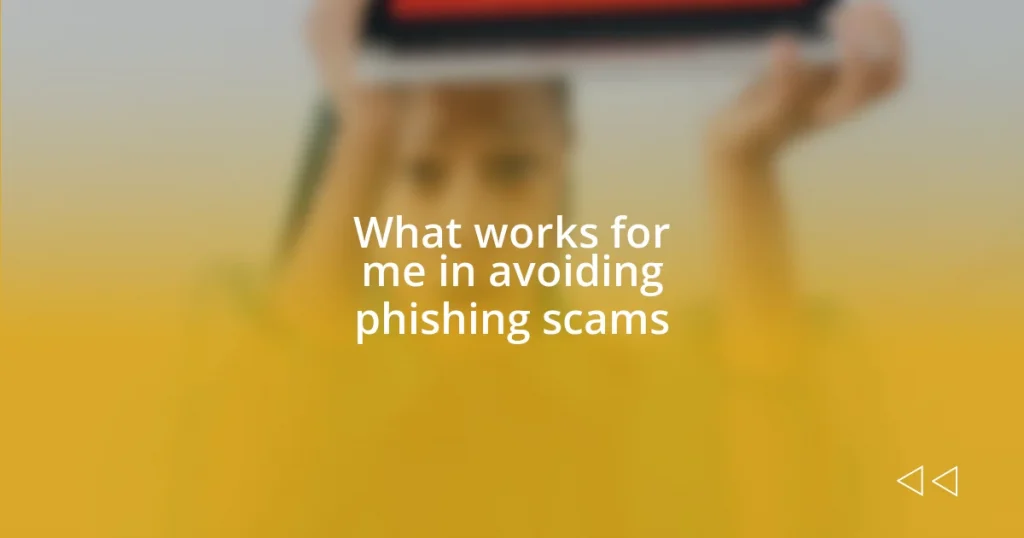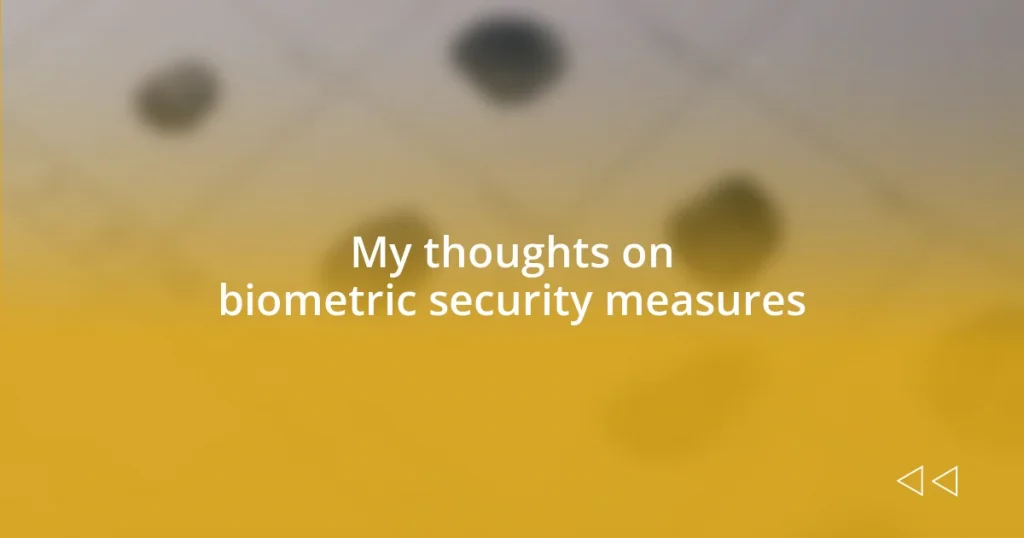Key takeaways:
- DeFi security risks highlight vulnerabilities such as smart contract bugs, reentrancy attacks, and phishing, emphasizing the need for thorough audits and security awareness.
- Auditing smart contracts is essential for risk mitigation, user confidence, compliance, and long-term viability, as demonstrated by the negative impact of neglecting audits in recent project failures.
- Future trends in DeFi security may include standard auditing practices, AI integration for real-time transaction monitoring, and enhanced community involvement in governance, promoting collective security efforts.

Understanding DeFi Security Risks
When I first delved into the world of Decentralized Finance (DeFi), the sheer potential of these platforms was thrilling. However, it became quickly apparent that with great innovation comes significant security risks. I often found myself questioning, “What safeguards are truly in place to protect my funds?” This uncertainty highlighted the importance of understanding vulnerabilities that could lead to severe financial losses.
Security in DeFi isn’t just about coding perfection, something I learned during a deep dive into various protocols. For instance, I witnessed how a small oversight in a project’s code could lead to a major exploit, impacting not just the project but also countless users. It’s alarming to realize that while many projects are striving to create groundbreaking solutions, others may overlook the necessity of thorough audits and transparent practices.
I remember a conversation with a friend who lost their savings to a hack on a DeFi lending platform. It was a stark reminder that phishing attacks and smart contract vulnerabilities are very real threats that can devastate users in an instant. This experience has driven home the importance of always prioritizing security awareness and staying informed about the risks associated with any DeFi interaction. How can we protect ourselves if we don’t fully understand these security risks?

Common Vulnerabilities in DeFi
As I navigated various DeFi platforms, I encountered a disturbing pattern of vulnerabilities that seemed to plague the space. Smart contract bugs, for instance, can expose systems to exploits where attackers manipulate code flaws to siphon off funds. I’ve spoken with developers who understand these risks, yet the complexity of smart contracts often leads to overlooked issues, which is both frustrating and alarming.
Common vulnerabilities include:
- Reentrancy attacks: A flaw where external contract calls allow the execution of code before the initial transaction completes, leading to potential fund theft.
- Flash loan exploits: Here, attackers use uncollateralized loans to manipulate market prices or drain liquidity pools within seconds.
- Phishing attacks: Deceitful tactics, such as spoofed interfaces or fake tokens, that trick users into divulging sensitive information.
- Oracle manipulations: Vulnerabilities in price feeds can allow attackers to exploit discrepancies and affect DeFi protocols relying on external data.
- Unverified code: The use of un-audited or poorly audited smart contracts significantly increases risk exposure for users.
Reflecting on these vulnerabilities makes me want to stress the importance of performing due diligence and adopting best practices. I’ve often found myself in heated discussions with friends about security measures, passionately advocating for thorough audits and community transparency. It’s a small but vital step in creating a safer DeFi environment.

Importance of Auditing Smart Contracts
Auditing smart contracts is not merely a formality—it’s a crucial step that can make or break a project in the DeFi landscape. When I was exploring a new lending protocol, I was relieved to find that they had undergone a comprehensive audit. Knowing that professionals examined their code gave me peace of mind, and I decided to invest. It’s fascinating how a reliable audit can instill confidence among users, and it’s a fundamental indicator of a project’s seriousness toward security.
I’ve learned that even the best coding practices are no guarantee against vulnerabilities. During a recent webinar, an expert mentioned that without audits, even the most innovative projects remain at risk. This struck me; I had always assumed that new tech would inherently be secure. I realized then that smart contracts can be intricate, and without audits, potential flaws might lie hidden, waiting to be exploited. An audit acts like a magnifying glass, bringing these hidden issues into sharp focus.
Reflecting on my experiences, I recognize that audits can significantly reduce the risk of hacks. A friend once told me about a startup that had secured financing but neglected to audit their smart contracts. Within weeks, they fell victim to a devastating attack that drained their treasury. Witnessing the aftermath—devastated developers and disappointed users—was heartbreaking. It underscores how vital audits are in safeguarding not just investments, but the reputations of entire projects.
| Aspect | Importance |
|---|---|
| Risk Mitigation | Audits identify vulnerabilities before deployment, reducing the risk of hacks. |
| User Confidence | Audited projects tend to attract more investors due to increased trust. |
| Compliance | Auditing can help ensure projects meet regulatory standards. |
| Long-term Viability | Projects that prioritize audits are more likely to succeed in the competitive DeFi landscape. |

Best Practices for Personal Security
When it comes to personal security in the DeFi space, I can’t stress enough the importance of using strong, unique passwords for your accounts. I recall a time when I relied on a familiar password across multiple platforms—what a mistake that was! One day, I received a notification that my wallet had been accessed, leaving me feeling an unsettling mix of panic and regret. Since then, I always use a password manager to generate and store complex passwords, creating an extra layer of protection against unauthorized access.
Two-factor authentication (2FA) has also become a non-negotiable part of my security routine. I remember when I set it up on my accounts; it felt like gaining an extra shield against potential thieves. That moment of frustration when I had to enter a code from my phone was well worth the peace of mind it brings. After all, isn’t it reassuring to know that even if someone has your password, they still can’t get in without that secondary confirmation? It’s a small step that can make a huge difference.
Moreover, I’ve learned to be highly cautious about the types of connections I make. There was a point when I was eager to join various online DeFi communities, and I found myself in a couple of sketchy Telegram groups. I felt out of my depth, surrounded by people who seemed to have an agenda that didn’t align with my values. It was a wake-up call for me to be vigilant about where my information is shared. Always question the legitimacy of sources and never disclose any personal or sensitive information. After all, isn’t maintaining privacy the first step toward securing your assets?

Evaluating DeFi Projects and Protocols
When evaluating DeFi projects and protocols, I always check their community engagement first. I recall a project that boasted impressive technology but had a ghost town for a community. This raised a red flag for me. A vibrant community often indicates transparency and active participation, which can reflect the overall health and integrity of a project. Do you ever wonder why that matters? Well, a strong community often helps to spot issues before they escalate, acting as a collective watchdog that validates the project’s credibility.
Another essential aspect I consider is the transparency of a project’s team. I remember researching a DeFi protocol where the founders were almost completely anonymous. While anonymity can sometimes enhance a project’s allure, in this case, it made me hesitate. Knowing who is behind a project can build trust; after all, would you invest in a business run by someone you can’t identify? Clear information about the team members, their backgrounds, and previous successes often reassures me that the project is built on a solid foundation.
Furthermore, analyzing the project’s tokenomics is critical. I once looked at a project that had an absurdly high allocation for insiders. It made me uncomfortable, as it hinted at a potential dump on investors once the token launched. Evaluating how a project distributes its tokens—be it for developers, early investors, or community incentives—can reveal its long-term vision. Does it prioritize growth and sustainability, or is it just a cash grab? Understanding these dynamics not only informs my investment decisions but also shapes my overall trust in the project.

Future Trends in DeFi Security
As I evaluate the future of DeFi security, I can’t help but think about the rise of auditing protocols in smart contracts. I recently came across a project that underwent a thorough audit, and it sparked my curiosity about how these audits will become a standard practice in the industry. It seems clear to me that ensuring the integrity of code will be non-negotiable if we want to build trust in decentralized finance. Isn’t it reassuring to know that independent experts are reviewing projects for vulnerabilities?
Another trend I foresee is the integration of artificial intelligence in security measures. The idea of AI analyzing transactions in real time to flag suspicious activities really excites me. I recall a time when manual monitoring felt like an overwhelming task for many DeFi users, leaving them vulnerable to hacks. With AI stepping in, we could see a more proactive approach to security that not only detects threats but perhaps even predicts them. Might this be the game-changer that the DeFi ecosystem needs to fortify itself?
Finally, I believe that community vigilance will take on a new dimension, especially in decentralized governance models. I remember engaging in a discussion about a project’s governance proposals, realizing the power that collective decision-making can wield. As more platforms implement decentralized governance, users will increasingly take responsibility for each other’s security. This evolution not only underscores the importance of user education but also fosters a sense of community that champions mutual protection. Isn’t that a compelling vision for the future of DeFi?





